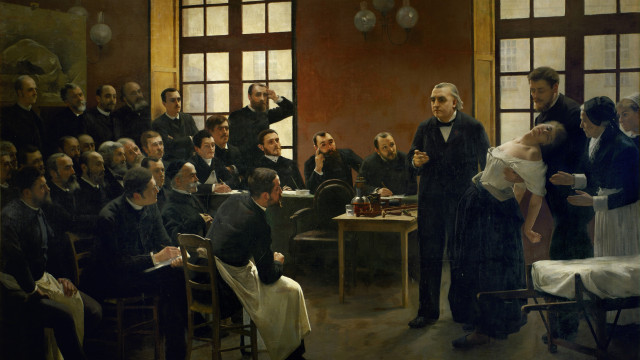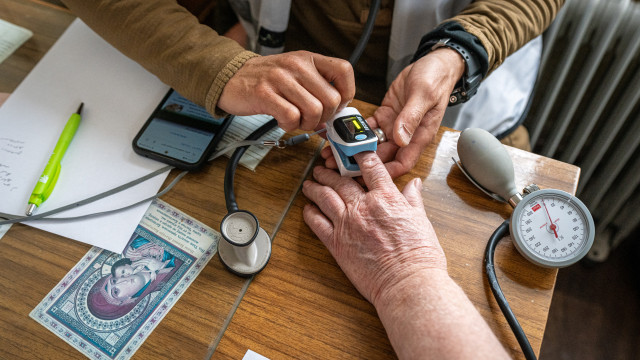






























See Also
See Again
What exactly is atrial fibrillation, and who are its celebrity sufferers?
- If there is no one in your immediate circle who has been diagnosed with atrial fibrillation, you'd be forgiven for not knowing what it was. One of the lesser-discussed heart conditions, atrial fibrillation causes the heart to beat irregularly and abnormally fast. And while awareness of atrial fibrillation is low, it is in fact quite common. There are even some quite famous faces who have been diagnosed with the condition. Intrigued? Check out this gallery to learn all about atrial fibrillation.
© Shutterstock
0 / 31 Fotos
Introducing atrial fibrillation
- For those of you who have never heard of the term, atrial fibrillation is a heart condition that causes an irregular and abnormally fast heartbeat.
© Shutterstock
1 / 31 Fotos
Healthy heart rate range
- A normal, healthy heartbeat should be regular, and it usually sits somewhere between 60 and 100 beats per minute.
© Shutterstock
2 / 31 Fotos
Heart rate in atrial fibrillation
- In a person with atrial fibrillation, the heart rate can exceed 100 beats per minute, sometimes by quite a long way.
© Shutterstock
3 / 31 Fotos
Symptoms
- While atrial fibrillation is sometimes symptomless and certain sufferers don’t know they have it, it can also cause dizziness, shortness of breath, and tiredness.
© Shutterstock
4 / 31 Fotos
Palpitations
- People with atrial fibrillation might also notice palpitations, sometimes in episodes that can last as long as a few minutes.
© Shutterstock
5 / 31 Fotos
When to see a doctor
- It is important that you see a doctor if you have chest pain that comes and goes, chest pain that goes away quickly but is still worrying, or you notice a sudden change in your heartbeat.
© Shutterstock
6 / 31 Fotos
When to see a doctor
- Equally, it is important to seek medical advice if your heart rate is consistently lower than 60 or above 100 (particularly if you’re also experiencing other symptoms such as dizziness or shortness of breath).
© Shutterstock
7 / 31 Fotos
When to call emergency services
- You should call emergency services if you have sudden chest pain that spreads to your arms, back, neck, or jaw, makes your chest feel tight or heavy, also started with shortness of breath, sweating, and feeling or being sick, or lasts more than 15 minutes.
© Shutterstock
8 / 31 Fotos
When to call emergency services
- These are symptoms of a heart attack; anyone experiencing them requires immediate and urgent medical attention.
© Shutterstock
9 / 31 Fotos
Risk groups
- It is not known exactly what causes atrial fibrillation, but it does seem to affect certain groups of people more than others.
© Shutterstock
10 / 31 Fotos
Risk groups
- Older people and people living with long-term (chronic) conditions such as heart disease, high blood pressure, or obesity appear to be at higher risk.
© Shutterstock
11 / 31 Fotos
Triggers - It also seems likely that the condition is triggered by certain situations, such as drinking too much alcohol or smoking.
© Shutterstock
12 / 31 Fotos
Paroxysmal atrial fibrillation
- There are various ways to define atrial fibrillation, depending on how it affects you. In paroxysmal atrial fibrillation, episodes come and go and they usually clear up on their own within 48 hours.
© Shutterstock
13 / 31 Fotos
Persistent atrial fibrillation
- With persistent atrial fibrillation, episodes tend to last longer than seven days (although they may be shorter if the patient is treated).
© Shutterstock
14 / 31 Fotos
Permanent atrial fibrillation - We talk about permanent atrial fibrillation when the condition is present in a person all the time.
© Shutterstock
15 / 31 Fotos
Long-standing atrial fibrillation
- And finally there’s long-standing atrial fibrillation, which we normally associate with a person who has had the condition for more than a year.
© Shutterstock
16 / 31 Fotos
Statistics
- While it may sound quite alarming, atrial fibrillation is in fact very common. For example, it affects around 1.4 million people in the UK alone.
© Shutterstock
17 / 31 Fotos
More common in men
- The condition can affect adults of any age, although it is more common in older people and it’s more likely to affect men than women.
© Shutterstock
18 / 31 Fotos
Treatment - Atrial fibrillation is not normally life-threatening but it can be uncomfortable, and in many cases it requires treatment.
© Shutterstock
19 / 31 Fotos
Stroke prevention
- Treatment is often aimed at preventing strokes (since people with atrial fibrillation are at higher risk of having a stroke).
© Shutterstock
20 / 31 Fotos
Controlling heart rate and rhythm
- There are also medicines that are sometimes prescribed to help control the heart rate or rhythm.
© Shutterstock
21 / 31 Fotos
Cardioversion
- In cardioversion, the patient is given a controlled electric shock in order to restore the heart's natural rhythm.
© Shutterstock
22 / 31 Fotos
Catheter ablation
- And, finally, with catheter ablation the area inside the heart that is causing the abnormal rhythm is destroyed using radio frequency energy.
© Shutterstock
23 / 31 Fotos
Pacemaker
- People who are treated with catheter ablation may need to have a pacemaker fitted afterwards to help their heart beat regularly.
© Shutterstock
24 / 31 Fotos
Atrial flutter
- People with atrial fibrillation may also have atrial flutter. The two conditions are similar in that they share symptoms, causes, and possible complications.
© Shutterstock
25 / 31 Fotos
Atrial flutter
- However, atrial flutter is less common than atrial fibrillation and the heart rhythm tends to be more organized and less chaotic.
© Shutterstock
26 / 31 Fotos
Atrial flutter - The treatment practice for atrial flutter is also slightly different–catheter ablation is usually the preferred treatment for flutter, while fibrillation is often first treated with medication.
© Shutterstock
27 / 31 Fotos
Celebrity connections
- If you are diagnosed with atrial fibrillation, you are in good company. In fact, there are a number of famous figures who have been diagnosed with the condition.
© Shutterstock
28 / 31 Fotos
Politicans
- According to his medical records, President Joe Biden has experienced periods of atrial fibrillation since having his gall bladder removed in 2003.
© Shutterstock
29 / 31 Fotos
Others
- Biden is joined by former UK Prime Minister Tony Blair, as well as other celebs such as Howie Mandel and Barry Manilow, in the list of famous people with this common heart condition. Sources: (NHS) (HealthCentral) See also: Stars who succumbed to heart attacks
© Shutterstock
30 / 31 Fotos
What exactly is atrial fibrillation, and who are its celebrity sufferers?
- If there is no one in your immediate circle who has been diagnosed with atrial fibrillation, you'd be forgiven for not knowing what it was. One of the lesser-discussed heart conditions, atrial fibrillation causes the heart to beat irregularly and abnormally fast. And while awareness of atrial fibrillation is low, it is in fact quite common. There are even some quite famous faces who have been diagnosed with the condition. Intrigued? Check out this gallery to learn all about atrial fibrillation.
© Shutterstock
0 / 31 Fotos
Introducing atrial fibrillation
- For those of you who have never heard of the term, atrial fibrillation is a heart condition that causes an irregular and abnormally fast heartbeat.
© Shutterstock
1 / 31 Fotos
Healthy heart rate range
- A normal, healthy heartbeat should be regular, and it usually sits somewhere between 60 and 100 beats per minute.
© Shutterstock
2 / 31 Fotos
Heart rate in atrial fibrillation
- In a person with atrial fibrillation, the heart rate can exceed 100 beats per minute, sometimes by quite a long way.
© Shutterstock
3 / 31 Fotos
Symptoms
- While atrial fibrillation is sometimes symptomless and certain sufferers don’t know they have it, it can also cause dizziness, shortness of breath, and tiredness.
© Shutterstock
4 / 31 Fotos
Palpitations
- People with atrial fibrillation might also notice palpitations, sometimes in episodes that can last as long as a few minutes.
© Shutterstock
5 / 31 Fotos
When to see a doctor
- It is important that you see a doctor if you have chest pain that comes and goes, chest pain that goes away quickly but is still worrying, or you notice a sudden change in your heartbeat.
© Shutterstock
6 / 31 Fotos
When to see a doctor
- Equally, it is important to seek medical advice if your heart rate is consistently lower than 60 or above 100 (particularly if you’re also experiencing other symptoms such as dizziness or shortness of breath).
© Shutterstock
7 / 31 Fotos
When to call emergency services
- You should call emergency services if you have sudden chest pain that spreads to your arms, back, neck, or jaw, makes your chest feel tight or heavy, also started with shortness of breath, sweating, and feeling or being sick, or lasts more than 15 minutes.
© Shutterstock
8 / 31 Fotos
When to call emergency services
- These are symptoms of a heart attack; anyone experiencing them requires immediate and urgent medical attention.
© Shutterstock
9 / 31 Fotos
Risk groups
- It is not known exactly what causes atrial fibrillation, but it does seem to affect certain groups of people more than others.
© Shutterstock
10 / 31 Fotos
Risk groups
- Older people and people living with long-term (chronic) conditions such as heart disease, high blood pressure, or obesity appear to be at higher risk.
© Shutterstock
11 / 31 Fotos
Triggers - It also seems likely that the condition is triggered by certain situations, such as drinking too much alcohol or smoking.
© Shutterstock
12 / 31 Fotos
Paroxysmal atrial fibrillation
- There are various ways to define atrial fibrillation, depending on how it affects you. In paroxysmal atrial fibrillation, episodes come and go and they usually clear up on their own within 48 hours.
© Shutterstock
13 / 31 Fotos
Persistent atrial fibrillation
- With persistent atrial fibrillation, episodes tend to last longer than seven days (although they may be shorter if the patient is treated).
© Shutterstock
14 / 31 Fotos
Permanent atrial fibrillation - We talk about permanent atrial fibrillation when the condition is present in a person all the time.
© Shutterstock
15 / 31 Fotos
Long-standing atrial fibrillation
- And finally there’s long-standing atrial fibrillation, which we normally associate with a person who has had the condition for more than a year.
© Shutterstock
16 / 31 Fotos
Statistics
- While it may sound quite alarming, atrial fibrillation is in fact very common. For example, it affects around 1.4 million people in the UK alone.
© Shutterstock
17 / 31 Fotos
More common in men
- The condition can affect adults of any age, although it is more common in older people and it’s more likely to affect men than women.
© Shutterstock
18 / 31 Fotos
Treatment - Atrial fibrillation is not normally life-threatening but it can be uncomfortable, and in many cases it requires treatment.
© Shutterstock
19 / 31 Fotos
Stroke prevention
- Treatment is often aimed at preventing strokes (since people with atrial fibrillation are at higher risk of having a stroke).
© Shutterstock
20 / 31 Fotos
Controlling heart rate and rhythm
- There are also medicines that are sometimes prescribed to help control the heart rate or rhythm.
© Shutterstock
21 / 31 Fotos
Cardioversion
- In cardioversion, the patient is given a controlled electric shock in order to restore the heart's natural rhythm.
© Shutterstock
22 / 31 Fotos
Catheter ablation
- And, finally, with catheter ablation the area inside the heart that is causing the abnormal rhythm is destroyed using radio frequency energy.
© Shutterstock
23 / 31 Fotos
Pacemaker
- People who are treated with catheter ablation may need to have a pacemaker fitted afterwards to help their heart beat regularly.
© Shutterstock
24 / 31 Fotos
Atrial flutter
- People with atrial fibrillation may also have atrial flutter. The two conditions are similar in that they share symptoms, causes, and possible complications.
© Shutterstock
25 / 31 Fotos
Atrial flutter
- However, atrial flutter is less common than atrial fibrillation and the heart rhythm tends to be more organized and less chaotic.
© Shutterstock
26 / 31 Fotos
Atrial flutter - The treatment practice for atrial flutter is also slightly different–catheter ablation is usually the preferred treatment for flutter, while fibrillation is often first treated with medication.
© Shutterstock
27 / 31 Fotos
Celebrity connections
- If you are diagnosed with atrial fibrillation, you are in good company. In fact, there are a number of famous figures who have been diagnosed with the condition.
© Shutterstock
28 / 31 Fotos
Politicans
- According to his medical records, President Joe Biden has experienced periods of atrial fibrillation since having his gall bladder removed in 2003.
© Shutterstock
29 / 31 Fotos
Others
- Biden is joined by former UK Prime Minister Tony Blair, as well as other celebs such as Howie Mandel and Barry Manilow, in the list of famous people with this common heart condition. Sources: (NHS) (HealthCentral) See also: Stars who succumbed to heart attacks
© Shutterstock
30 / 31 Fotos
What exactly is atrial fibrillation, and who are its celebrity sufferers?
© Shutterstock/Getty Image
RECOMMENDED FOR YOU




























MOST READ
- Last Hour
- Last Day
- Last Week








